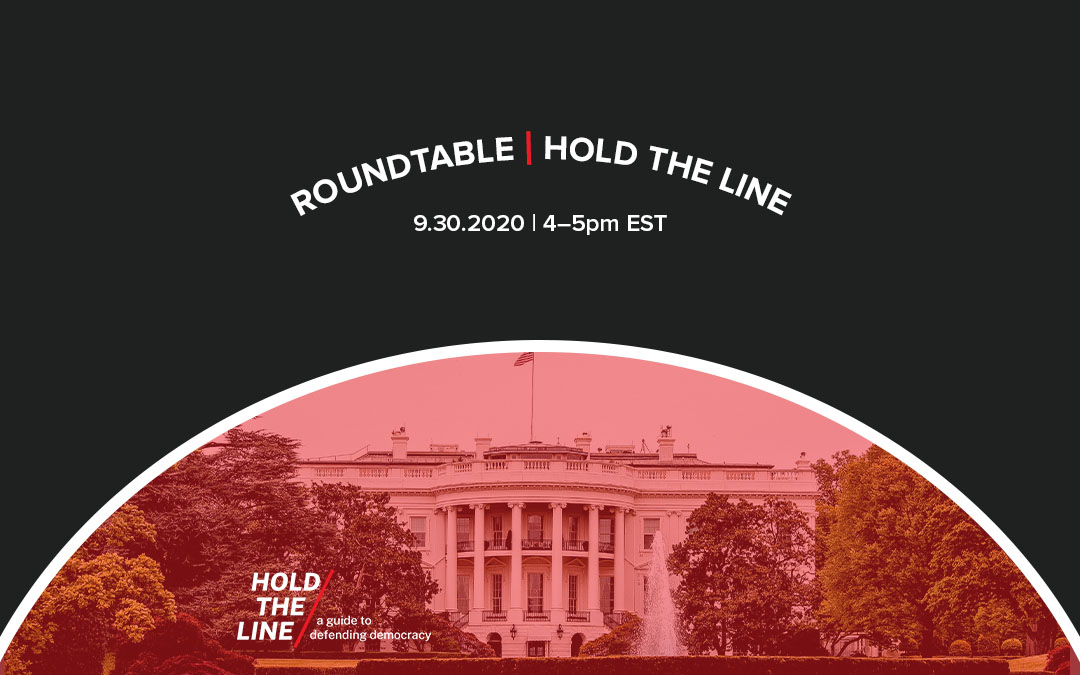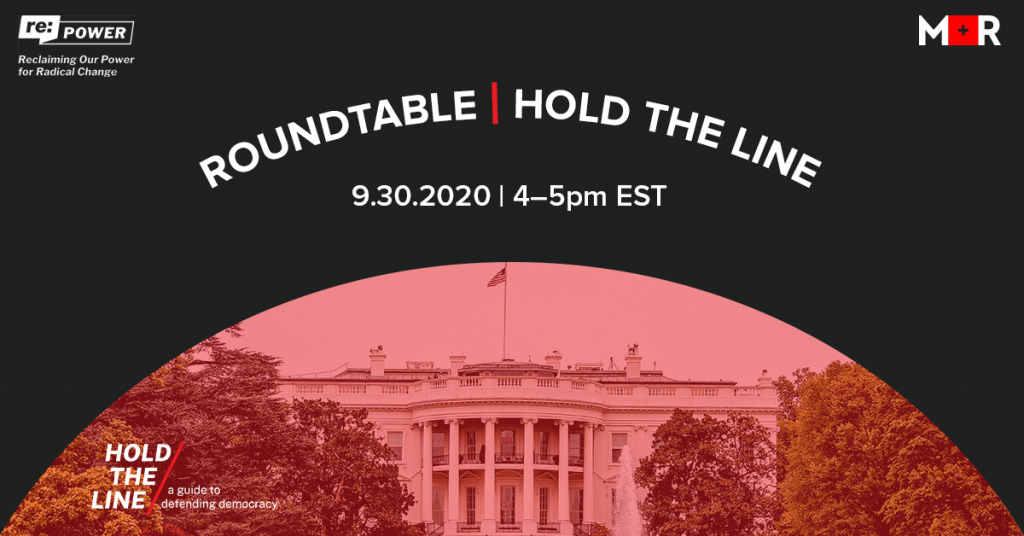In case you missed it, M+R is teaming up with re:power to host a Roundtable on September 30 from 4–5pm EST with Hold the Line.
DON’T WAIT: As we post this, 480 people have registered! We will host a simultaneous live stream on our Facebook page for any Zoom overflow. Register here!
This interactive panel discussion will bring together M+R and re:power organizers and trainers, nonprofit leaders, activists, and experts in nonviolent movements. We’ll discuss a variety of scenarios that might result from a contested election, the data-driven nonviolent approach recommended for resisting, and how nonprofits can respond. We’ll also share some additional tools to help your organization make a plan.
Here’s who’ll be on:
- Authors of the Hold the Line Guide: Kifah Shah of MPower Change, Hardy Merriman, Ankur Asthana of M+R, and Marium Navid of M+R
- Uyen Doan, Managing Director of Program & Partnerships at re:power
- Jamarr Brown, Director of Electoral Programs at re:power
- Marc Ruben, Partner at M+R
Can’t make the Roundtable? We’ll share a recording afterward right here on this blog—sign up for updates to get the recording in your inbox when it’s ready.
And in case you missed our background materials about Hold the Line, here are some resources to get you started:
Hold the Line: A Guide to Defending Democracy.
This new resource offers a detailed roadmap for three potential scenarios we might face during and after the election. It grounds this moment in vital research on how nonviolent mass action has worked in other countries to combat authoritarian regimes and win—and how it can work here. (M+R staffers helped put this guide together as part of an interracial, intergenerational group with experience in activism, organizing, and global pro-democracy movements.)
The guide is written for anyone, but it’s a useful tool for nonprofits to think through tactics and organizing asks in the following scenarios:
- SCENARIO 1: Election day results are unclear, and Trump declares victory anyway. In this scenario, Trump may declare victory even if the election day results are ambiguous, or may attempt to prevent every vote from being counted. In some states, this could look like mail-in or other ballots being discarded or not being counted.
- SCENARIO 2: Election results show significant irregularities and/or signs of tampering, and Trump declares victory. In this scenario, Trump may attempt to prevent every vote from being counted as described in Scenario 1. He may also declare victory despite significant irregularities and/or signs of tampering. In some states, this could look like voting machine malfunctions, voter intimidation, abnormal margins, or decreased access to mail services.
- SCENARIO 3: Trump loses the election but refuses to leave office. In this scenario, Trump may refuse to concede or leave office. In some states, it could look like representatives or election administrations making claims of voter fraud despite Trump clearly losing.
The guide lays out much more detail for these scenarios and how they might play out—from states sending competing electoral college votes to Congress, to Trump deploying military forces domestically under the guise of maintaining “law and order.”
It’s enough to make anyone break out an Olivia-Pope-sized glass of merlot (or sparkling water).
But here’s one thing we know from a mountain of research on movements in other countries and in the US: nonviolent resistance works. When autocrats have disputed election results and refused to leave office, mass nonviolent action from people across economic and social backgrounds has consistently caused authoritarian takeovers to fail.
If this is our only way to save our democracy (and it very well might be), nonprofit leaders have a big role to play. Nonprofits are conduits for ordinary people to change the world and alleviate suffering. People listen to us, give money to us, and in the massive effort that WILL be needed to protect our democracy, nonprofits must not only show up but LEAD.
We will need people in the streets from all political persuasions. We will need to create a hugely visible effort that provides political cover for election officials, county clerks, judges, legislators, governors, attorneys general, and the media to stand for what’s right, even if there’s enormous pressure to cave in the face of Republicans’ institutional power.
Brands can echo social movements, but they’re not going to lead us out of this mess. When trusted nonprofits talk, people listen. We need to be ready to show the way.
Get the conversation started with this sample agenda:
• Take a deep breath. Acknowledge that this is scary for many of us. But collectively, history has shown that we have power to prevent a bad outcome.
• Walk through the scenarios in Part II of the Guide.
• For each scenario, discuss how this organization might be willing to support mass coordinated nonviolent action.
○ What will our donors, activists, and supporters be looking for from us in this scenario? If this is the only issue getting any media airtime in our country for multiple weeks, how might that change our priorities and our communications?
○ What tools do we have at our disposal to support an organic nonviolent pro-democracy movement that emerges?
○ How might a scenario where fundamental democratic norms are subverted change our organizational “comfort zone?”
○ How can we prepare organizational leadership, board members, etc, for this situation and what might be required of us?
○ How do we ensure we’re putting the needs and safety of the most vulnerable populations first when considering our actions?
• How will a contested election impact various organizational priorities this fall, including:
○ End of year fundraising
○ Annual strategic planning
○ 2020 and/or 2021 budgets
• What can we do now to prepare our supporters for this moment?
• What can we do now to prepare our organization for this moment?
Thanks for having the tough conversations. It really matters that we do this. If nonprofits show up late to this party, it could have catastrophic results for our democracy.
If, on the other hand, we have the courage to lead…this could be our shining moment.




